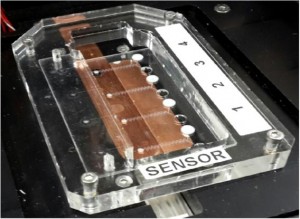 organisation the CSIRO has developed biologically-based sensors, which it says could provide the dairy industry with a “one-stop shop” for fast and sensitive detection of contaminants related to product safety and quality.
organisation the CSIRO has developed biologically-based sensors, which it says could provide the dairy industry with a “one-stop shop” for fast and sensitive detection of contaminants related to product safety and quality.The CSIRO said the biosensor platform had successfully detected proteases in milk at concentrations relevant to industry within a few minutes. The current industry-standard test requires several hours to detect these substances. The same platform could potentially monitor a range of other natural components and contaminants of milk, according to the CSIRO.
Dr Stephen Trowell from CSIRO, who led the biosensor research team, said that proteases in milk can affect the flavour of UHT milk and also cause it to curdle. While the bacteria that cause spoilage are eliminated through heat treatment, proteases can survive the treatment, so accurate and fast detection of these has significant implications for processing as well as product quality and shelf life.
“We’ve achieved fast and accurate detection of proteases in milk, which could give the dairy industry greater confidence in the shelf life of processed products,” Dr Trowell said. “We would like to apply similar technology to fresh milk, which would not only assist in our domestic market but as we have seen in the media recently could help further open up the possibilities for Australian dairy exports,” he said.
Dr Trowell said the biosensors could be integrated into on-farm or post-farm production processes to measure multiple compounds in real-time.
“We are developing a range of other sensors, which in the future we hope could be used to detect things like toxins, pesticide residues or adulterants like melamine,” Dr Trowell said.
“Whilst the Australian industry produces a very high quality product, being able to quickly substantiate product safety and quality could provide our industry with a competitive advantage in overseas markets,” Dr Trowell said. “At the moment we can see a clear path to incorporating these sensors into processing facilities, but down the track they could even be used at the farm gate,” he said.
Sensor “based on nature”
The CSIRO said its sensing platform was “based on nature”, and mimicked the function of an animal’s senses of taste and smell. Dr Trowell said it was this biological basis that made the sensors a significant achievement for industry.
“Our biosensors are faster and more sensitive than other, chemical alternatives, and don’t rely on a sensing surface, instead, the molecular sensors are mixed with the sample and they flow continuously through a channel,” Dr Trowell said. “This means that each sensor is used only once and then replaced by others in real time, allowing accurate detection within minutes or even seconds,” he said.
“Already, our technology can measure up to four different chemicals simultaneously from a tiny sample, and with our proof-of-concept studies in milk and other beverages, we are able to talk seriously about the future role of these sensors in beverage production,” Dr Trowell said.
The proof-of-concept detection of proteases in milk was achieved using the CSIRO’s proprietary Cybertongue technology. These results, and CSIRO’s other achievements in biosensor technology, will be presented this week at the international Biosensors 2014 conference in Melbourne, Australia.





